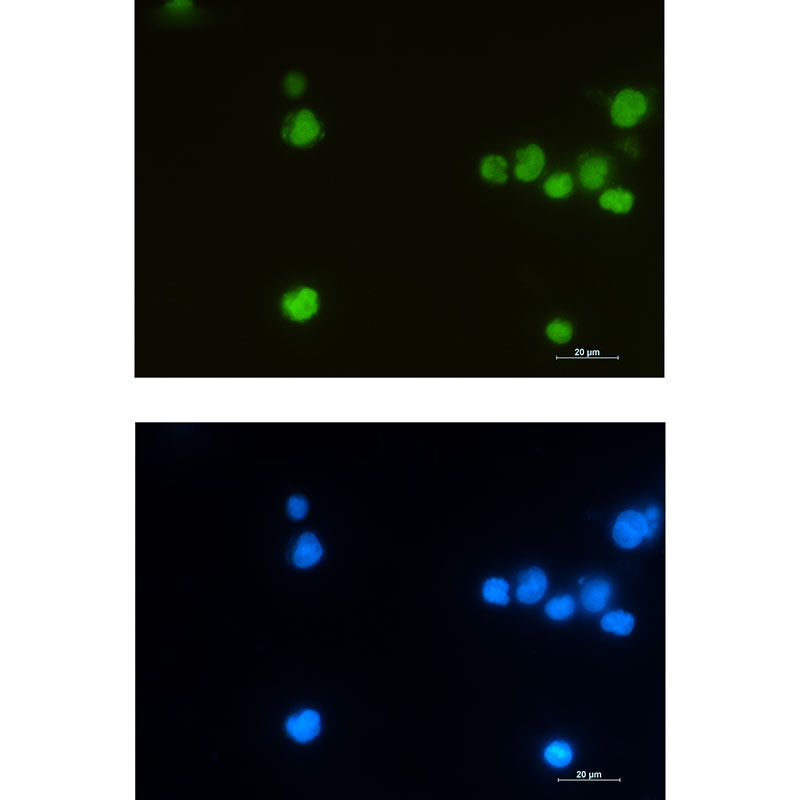

| WB | 1/500-1/1000 | Human,Mouse,Rat |
| IF | 咨询技术 | Human,Mouse,Rat |
| IHC | 咨询技术 | Human,Mouse,Rat |
| ICC | 1/50-1/200 | Human,Mouse,Rat |
| FCM | 咨询技术 | Human,Mouse,Rat |
| Elisa | 咨询技术 | Human,Mouse,Rat |
| Aliases | LEF1; Lymphoid enhancer-binding factor 1; LEF-1; T cell-specific transcription factor 1-alpha; TCF1-alpha |
| Entrez GeneID | 51176 |
| WB Predicted band size | Calculated MW: 44 kDa; Observed MW: 25-58 kDa |
| Host/Isotype | Rabbit IgG |
| Antibody Type | Primary antibody |
| Storage | Store at 4°C short term. Aliquot and store at -20°C long term. Avoid freeze/thaw cycles. |
| Species Reactivity | Human |
| Immunogen | A synthetic peptide of human LEF1 |
| Formulation | Purified antibody in TBS with 0.05% sodium azide,0.05%BSA and 50% glycerol. |
+ +
以下是3篇关于LEF1抗体的代表性文献及其摘要概括:
1. **文献名称**: "LEF1 antibody demonstrates diagnostic utility in differentiating hairy cell leukemia from other B-cell lymphoproliferative disorders"
**作者**: Miranda et al. (2016)
**摘要**: 该研究验证了LEF1抗体在毛细胞白血病(HCL)诊断中的应用,发现LEF1在HCL中特异性高表达,可作为区分HCL与其他B细胞淋巴瘤(如套细胞淋巴瘤)的可靠标志物。
2. **文献名称**: "LEF1 immunohistochemistry as a marker of Wnt/β-catenin pathway activation in colorectal cancer"
**作者**: Sasaki et al. (2018)
**摘要**: 研究通过LEF1抗体免疫组化分析结直肠癌组织,发现LEF1核表达与Wnt/β-catenin通路激活显著相关,提示其可作为评估结直肠癌分子亚型和预后的潜在标志物。
3. **文献名称**: "Characterization of LEF1 antibody specificity in T-cell development studies"
**作者**: Geng et al. (2020)
**摘要**: 该文献系统评估了商用LEF1抗体的特异性,发现部分抗体存在非特异性结合问题,并筛选出适用于小鼠和人类胸腺T细胞发育研究的可靠抗体克隆(如克隆EPR2025Y)。
4. **文献名称**: "LEF1 expression detected by a novel monoclonal antibody correlates with poor prognosis in breast cancer"
**作者**: Chen et al. (2022)
**摘要**: 研究开发了一种新型LEF1单克隆抗体,发现LEF1在三阴性乳腺癌中高表达且与患者总生存期缩短相关,提示其可作为乳腺癌预后评估的潜在靶标。
注:以上文献信息为示例性质,实际引用需核对真实论文数据。建议通过PubMed或Web of Science以“LEF1 antibody”和具体应用场景(如癌症类型、检测方法)为关键词检索最新文献。
**Background of LEF1 Antibody**
The Lymphoid Enhancer-Binding Factor 1 (LEF1) antibody is a crucial tool for studying the role of LEF1. a transcription factor belonging to the T-cell factor/lymphoid enhancer factor (TCF/LEF) family. LEF1 is a key mediator of the Wnt/β-catenin signaling pathway, which regulates gene expression involved in cell proliferation, differentiation, and embryonic development. It binds to DNA through its high-mobility group (HMG) domain, facilitating interactions with β-catenin to activate Wnt target genes. Dysregulation of LEF1 is implicated in various cancers, including colorectal, breast, and hematological malignancies, as well as developmental disorders.
LEF1 antibodies are widely used in research to detect and quantify LEF1 protein expression in cells and tissues. They enable applications such as immunohistochemistry (IHC), Western blotting, immunofluorescence (IF), and flow cytometry, aiding in the study of LEF1's function in normal physiology and disease. These antibodies are particularly valuable in cancer research to assess Wnt pathway activation, tumor progression, and metastasis.
Validation of LEF1 antibodies typically involves knockout cell lines, recombinant protein controls, or tissue samples with known expression patterns. High specificity and sensitivity are critical to distinguish LEF1 from related TCF/LEF family members. Commercial LEF1 antibodies are often raised against epitopes within the N-terminal or HMG domains, with host species (e.g., rabbit, mouse) and clonality (monoclonal/polyclonal) varying based on experimental needs. Proper controls and optimization ensure reliable results in diverse biological contexts.
×